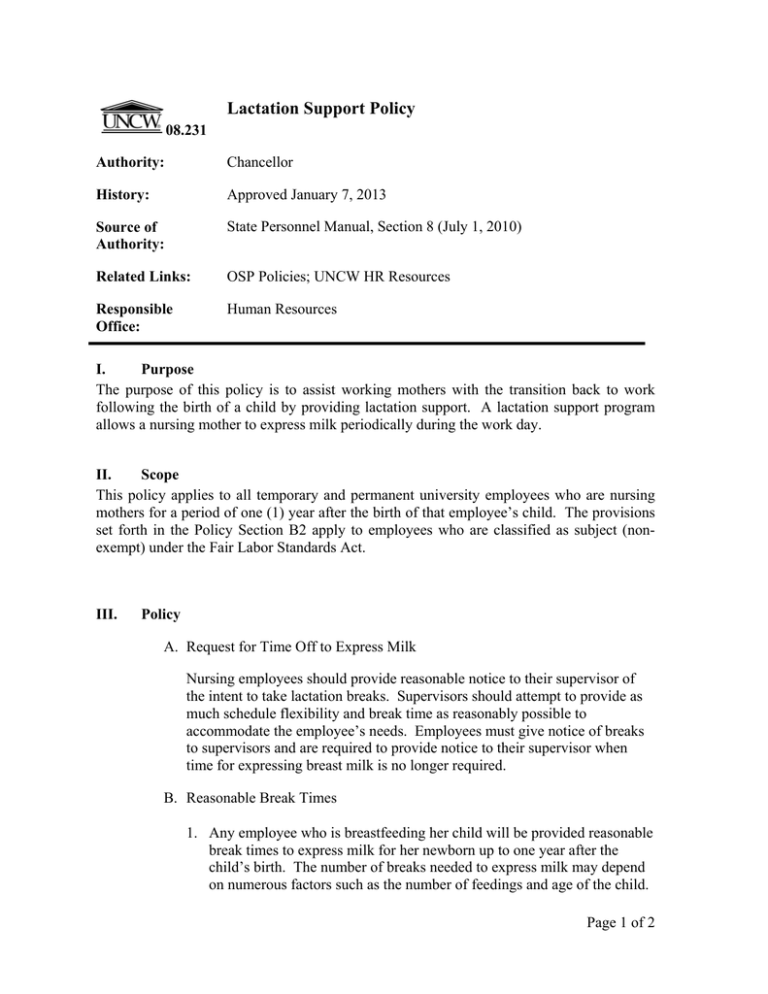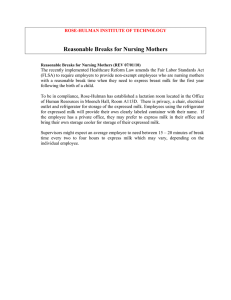Lactation Support Policy
advertisement

Lactation Support Policy 08.231 Authority: Chancellor History: Approved January 7, 2013 Source of Authority: State Personnel Manual, Section 8 (July 1, 2010) Related Links: OSP Policies; UNCW HR Resources Responsible Office: Human Resources I. Purpose The purpose of this policy is to assist working mothers with the transition back to work following the birth of a child by providing lactation support. A lactation support program allows a nursing mother to express milk periodically during the work day. II. Scope This policy applies to all temporary and permanent university employees who are nursing mothers for a period of one (1) year after the birth of that employee’s child. The provisions set forth in the Policy Section B2 apply to employees who are classified as subject (nonexempt) under the Fair Labor Standards Act. III. Policy A. Request for Time Off to Express Milk Nursing employees should provide reasonable notice to their supervisor of the intent to take lactation breaks. Supervisors should attempt to provide as much schedule flexibility and break time as reasonably possible to accommodate the employee’s needs. Employees must give notice of breaks to supervisors and are required to provide notice to their supervisor when time for expressing breast milk is no longer required. B. Reasonable Break Times 1. Any employee who is breastfeeding her child will be provided reasonable break times to express milk for her newborn up to one year after the child’s birth. The number of breaks needed to express milk may depend on numerous factors such as the number of feedings and age of the child. Page 1 of 2 A nursing mother will typically need two to three breaks during an eight hour period; however, more break times may be necessary. 2. Employees who are subject to the Fair Labor Standards act may take lactation breaks during existing break periods as designated by the employee’s department. Lunch breaks may be shortened to account for a morning and an afternoon lactation break. If the employee uses time other than a regularly scheduled break time or if the employee’s department does not have designated break times, then the employee will be required to either: (1) make up that time during the same work day; (2) use vacation leave; or (3) take leave without pay for that period of time. FLSA subject (non-exempt) employees may also arrive at work earlier than the regular starting time or leave later than the regular departure time to account for lactation breaks. C. Lactation Locations Lactation locations must be private, shielded from view, and not located in a restroom or common area. If an employee has a private office, it may be used for this purpose. If a dedicated lactation room is not accessible, supervisors should consider other options such as reserving a conference room as needed, adapting a clean and infrequently used small storage area, or converting an unused office or other room. The lactation location should contain a chair, electrical outlet, a small table or other flat surface, and a door which can be locked or secured. For a current list of designated lactation locations please visit HR’s Helpful Resources page. Employees may contact Human Resources for a list of current lactation locations at http://www.uncw.edu/hr/resources.html. D. Storage of Breast Milk The University is not responsible for the integrity or security of breast milk stored in any refrigerator on campus. Nursing mothers may use campus refrigerators or may bring personal coolers to store breast milk. Employees must provide their own containers for storage of expressed milk while on campus. Employees should check with supervisors to determine if there is a refrigerator available near their work area where breast milk may be stored. If there is no refrigerator available, employees must provide their own means to store and keep the milk cool, such as a cooler bag. Page 2 of 2
